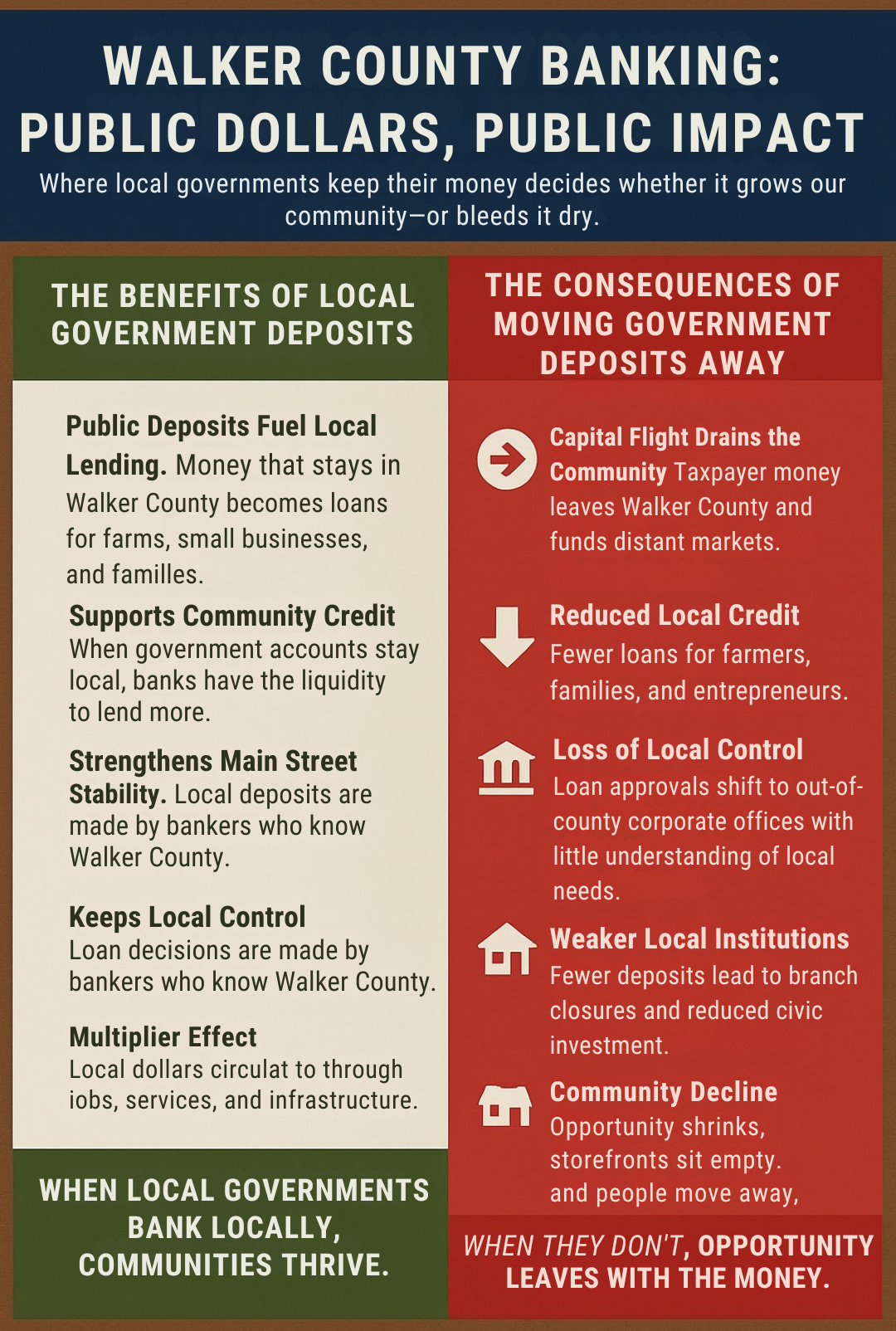Walker County's Baffling Bank Shuffle
Puzzling financial decisions have prompted increasing citizen scrutiny. Most of it aimed at the new officials and employees who are discovering their honeymoon grace period has ended.
There’s a new banker in town for Walker County’s government, and you’ll never guess where their office is. Because it isn’t here. Not in LaFayette. Not in Chickamauga or Rossville. In fact, the financial institution our Chairwoman, Angie Teems, has apparently decided is best suited to handle our public funds doesn’t have a single branch, or even a lonely ATM, within the entire physical bounds of Walker County.
Let that sink in. The county government has started moving millions of our tax dollars to Regions Bank, a cold, corporate leviathan headquartered—not in Georgia but in Alabama and which has zero physical or human investment in the community.
Now, you might wonder how this happens. Normally, a governing body puts out what’s called a Request for Proposal, or an RFP for vendors on most things. Banking is no different. It’s a beautifully simple, transparent process. You announce what you need (in this case, banking services) and let qualified vendors submit bids and then selection is done in the open to give the taxpayers the absolute best deal on fees, interest, and service. It’s the gold standard for avoiding backroom deals and ensuring good stewardship of public money.
I know all this because the process used by Chairwoman Teems and really the whole situation made me curious. So that meant research. Lots of it. I went looking at RFPs from other Georgia cities and counties from the past five years.
From the one city to the next and with county after county, I found a fascinating and predictable pattern. First they all used an RFP for procurement of a banking provider. And every single one had a baseline requirement before a bank could even submit a bid: they had to have a full-service branch within the county, or at the very least, within a few miles of the county seat. Or city limits. It’s a common-sense rule. And it’s also a best practice recommended by government accounting organizations.
And right there, is at least one likely reason why Chairwoman Teems didn’t bother with an RFP or any other competitive bidding or public selection process. Had she followed the standard, transparent, taxpayer-first best practice, Regions Bank wouldn’t have even been allowed to apply. They would have been disqualified on page one.
So, instead of an open competition, we got what appears to be a private placement, a decision made in the shadows with no public record and no justification open to scrutiny. That’s not just odd; IT IS WILD.
This secretive process has reportedly resulted in transfers totaling $12 million thus far—out of our local economy(yes local economy, see the infographic at the end) and into the coffers of an megacorporation. Make no mistake, this move by Teems will have negative downstream impacts no one can predict.
Community banks turn deposits into mortgages for young families, loans for small businesses and entrepreneurs, and lines of credit for farmers. Pull the money out and lending dries up. That means higher rates, fewer approvals, and tougher odds for our neighbors we know and businesses we frequent.
Whatever flashy interest rate or digital service the county may have been promised by Regions to induce the move, the trade-off is brutal.
By moving millions to a bank with no branch, no ATM, and no stake in Walker County, our leaders didn’t just switch banks. They weakened the very system that keeps this community alive.
This brings us to the part of this saga that struck a nerve with me. The bank the county government just jilted or is in the process of jilting is The Bank of LaFayette. You don’t have to be a customer (I’m not) to know its story. It’s a cornerstone of this county, run by the same local family, the Gilberts, for generations. It has stood here for more than 125 years.
They offer up their own buildings as free community meeting rooms in LaFayette and Rock Spring, a direct investment in our civic life. And I could fill an entire column simply by listing the events and activities and entities that have been sponsored or promoted by the Bank of LaFayette.
But their loyalty goes much, much deeper than buildings or sponsorships. Oh—and that’s not even mentioning the land donations. Gilbert Elementary is called that for a reason.
If the Hutcheson family were the community pillars of the northern half of the county through much of the 20th century, then the Gilbert family—and the Bank of LaFayette they continue to manage—have been the equivalent for the entire county for just as long, and still are today.
Do you remember 2017? When Walker County was teetering on the edge of insolvency and a state takeover? When newly-elected Commissioner Shannon Whitfield was desperately searching for a lender to keep the lights on? No one would touch the county government. The risk was too great. No one, that is, except The Bank of LaFayette.
It wasn’t a simple call for a community bank. A dozen or more their size—and bigger—go under every year from one risky bet too many. But this one stepped up, put its own neck on the line, and handed over a $5 million lifeline to save the county from state takeover and the crippling property tax hikes that would follow. They took the gamble when no one else would. Certainly not banks in Birmingham Alabama.
Yet here we are in the year of our lord 2025 and our new leadership’s response is to yank millions of dollars out of their able management in a deal with a bank headquartered in another state whose nearest branch is in another county—to say this is shrouded in controversial elements and red flags is an understatement.
So now, we are left with questions. What was the justification for this move? Was a “better deal” really secured? If so, where is the documentation? Were local banks offered the chance to match? Why was standard transparent, competitive process for procurement ignored here?
Why betray a pillar of the community? Why flush a relationship with a solid local partner that literally saved this county and its taxpayers from severe financial hardship just a few years ago?
This isn’t just about banking. It’s about transparency, loyalty, and common sense.
Citizens are owed answers. Until we get them, every taxpayer in Walker County should be questioning the judgment of those who engineered this baffling saga.





Great article and reporting. I think you make some good points about the benefits of keeping the money local.
I'm assuming the county got some benefit of moving to Regions, such as a higher interest rate. I think that shows a mentality that many Republicans have had for a while now - running government like a business. A business would make the best financial decision, regardless of loyalty (let's ignore the long term consequences of that decision for the moment). So the government is just doing what a business would do. You argue that the county might should make a less optimal financial decision because of the real world impact to its citizens. I agree and I think that can extend to make other government decisions. I'm not suggesting we be careless with taxpayer money, but I believe we need to start thinking more about how our government can improve their communities and lives of their people.